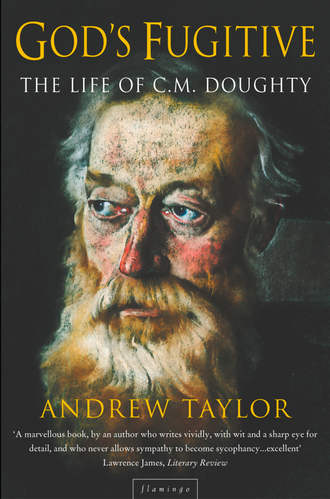
Полная версия
God’s Fugitive
For his first few months out of England, though – ‘a long year’, he called it later5 – he stayed in Leiden and the nearby Dutch towns, following his lonely studies and applying himself to learning the language.
He had a vague idea of investigating the historical background of the English civilization which fascinated him – but when he left Holland, he had, like Sandys before him, no plan for where his travels or his studies would lead him. The opportunity to observe the life of the travelling Arabs at first hand – the opportunity which was to provide him with the raw material for his greatest literary work – came to him by chance rather than by intent. One of his greatest talents was in allowing his life to be taken over by such chances and in seizing the benefit of them.
The next two years are the first period of Doughty’s life for which his own detailed and contemporary records exist. His diary, painstakingly written in his neat, precise hand, with its occasional pen and ink or pencil diagrams and sketches of landscapes, archaeological remains, or whatever else caught his attention, is far from exhaustive: some vital moments are casually skipped, there are occasional long gaps with no entries at all, and the whole account ends in March 1873, with Doughty still in Italy. His later travels around Greece, Egypt, Sinai and the Middle East can only be pieced together from letters, later memories and other patchy records. Even more frustrating, for much of the time as he wandered around Europe, his imagination seemed infuriatingly disengaged. But the hardback notebook which is now kept in the library of Caius College, Cambridge, faded and battered at the edges, gives an intimate picture of his intellectual and emotional development over a crucial spell of his young adulthood.
It starts as he leaves Leiden for Louvain, with a distaste for his surroundings which was to become familiar over the next few months: Doughty’s impressions of northern Europe were less than enthusiastic. In Louvain – a ‘very filthy and unwholesome’ town – he noted ‘the obscene manners of the people who piddle openly in every place’, although the observation was carefully crossed out in the diary. Presumably it was a little too crude even for a personal notebook. It remains legible, though, behind Doughty’s pencil scribble, as his fastidious indictment of the Belgian people.
He presents much the same litany of dissatisfaction that any middle-class traveller from Britain at that time might have recited. The people, being foreign, were grubby, unhealthy and – worst of all – Catholic.
As he toured the small towns of Holland and Belgium, Doughty displayed an almost comically fastidious obsession with cleanliness: the details that do excite his imagination are those that arouse his distaste – the people of Louvain piddling in the street, or the ‘slack, ill complexions’ of the Belgian women. But what is noticeable throughout the young Doughty’s notes of his travels in Europe is how conventional, dismissive and simply unobservant they generally are. For the most part, the man who would later tease out the most intimate, most significant details of life among the Arabs appeared to take only the most cursory interest in the places and people he met. It was the primitiveness and frequent brutality of Arabia which would excite his imagination; travel in Europe was often little more than inconvenient, uncomfortable, and not notably relieved, for him at least, by any architectural beauty.
His courage is already evident; but though there is no note of fear or nervousness as he describes his journey through northern France, there is no sense of personal involvement either. His interest was never engaged by politics, even though he was travelling through a Europe that was in political turmoil. Only a few months before, Bismarck had swept aside the French army and the government of Napoleon III: France was buzzing with ideas and arguments, alive with revolutionary and anarchist institutions. While Doughty was in Louvain, observing with distaste the ill-manners and grubby habits of the Belgians, some 25,000 people were being massacred in Paris as the French troops of the government of Adolphe Thiers crushed the Commune6 – but his only response, as he reached the frontier town of Tourcoing a few weeks later, was to note the inconvenience that such political activity caused the independent traveller. ‘Stayed there that night having no passport, as I had not heard it was become necessary. Thiers elected President the day before …’
Paris itself, a city which had in the last few months experienced defeat at the hands of the Prussian forces, which had seen tens of thousands of its citizens flee as the revolutionary Commune was established, and thousands more killed or arrested as it was put down, he described as ‘brown, cold, humid, deserted, uncheerful looking’.
After such a political cataclysm any city could perhaps be excused for being slightly less than cheerful. Doughty’s undoubted patriotism and sense of civic pride took little account of what he perhaps saw as the mere passing fads of a moment, like revolutions; his mind was set on a longer, greater timescale. And anyway, he might have thought, this was not England.
But he was not staying in Paris. It was now early autumn and, planning to take lodgings for the winter in one of the small towns dotted along the Mediterranean coast, he set off hopefully in the late summer sun, trudging from settlement to settlement.
For a man who complained frequently of his frail physical condition and his lack of robustness, a journey by foot of over 150 miles eastwards from Marseilles, through Cassis, Cannes and Nice, must have been a painful struggle anyway – and one after another they fell short of his exacting standards of comfort and cleanliness. There would be many more times in Doughty’s life when he would complain of his weakness and demonstrate his hardihood.
But at length he arrived in the town of Menton, where he seems to have felt at once that he could happily pass the winter. His room at the Pension Trenca, Beau Rivage, looked south over the sea, the mountains towering behind, and here he stayed for several months. For the first time a note of real enthusiasm comes into Doughty’s writing as he describes
happy long family voyages and hungry, beautiful, and aromatic wanderings in the mountains … The vineyards, the orchards of oranges and odoriferous lemons, everywhere open to be traversed by a thousand paths; the hundred happy and sheltered valleys, smiling with every gift of nature …
He was still complaining querulously of his ill-health and his weak constitution, but according to his diary, he was also deep in his studies throughout the winter. When he left his books, he would tramp along the mountain paths to see the tiny villages, the meadow flowers, the tumbling rivers and, most of all, ‘the antique caverns and relics of human habitation’. Doughty already had in mind the outline of the epic poem he saw as his greatest work, which would deal in part with the struggle of the ancient Gauls for conquest in northern Italy.7
In his wanderings during his five months in Menton Doughty built up such an affection for the region that, twenty years later, he would return to live just a few miles up the coast. But once the winter was over, he set out on foot again through the mountains.
It was a solitary time: the occasional references to family outings from Menton, to some ‘agreeable Germans’ he met later in Pisa, or to the ‘many excellent and agreeable persons, the librarian Dr Snellaert and others’ he remembered from Ghent, only serve to emphasize how lonely his travelling generally was. Solitude, after all, was what he was searching for.
Doughty pressed on with his hard and energetic journey: thirty miles or so up into the Piedmontese uplands one day, another forty miles the next, a brief day’s rest in the cool of the mountain valleys, and then another thirty miles down a river valley to the coastal town of Ventimiglia. It was the country plantations, the flowers and the oranges, the twisting mountain paths overlooking the sea, that caught his imagination; when he reached the cities of Genoa, Livorno, Pisa and Florence, the treasures of the Italian Renaissance were jotted down in his diary with more of a sense of duty than of enjoyment.
But when Doughty arrived in Naples sometime in April, it was to witness a more terrifying example of the forces of nature than he had ever seen before. The nearby Mount Vesuvius had already been rumbling ominously for several months, with occasional minor explosions of rocks and stones, and trickling rivulets of lava bubbling from its crater. It was not at first a cause for great consternation in the surrounding countryside – the last time lava streams had run down the mountainside, four years earlier, joyful local villagers had celebrated the onrush of visitors they confidently expected in their restaurants, cafés and boarding houses.
But this time was different. On the night of 26 April Professor Paride Palmieri, a scientist who had made a career out of observing Vesuvius, was settled in his observatory near the summit. Shortly after midnight he observed a small group of curious tourists passing by with an inexperienced guide on their way up the mountainside – and then, some three hours later, the summit of Vesuvius exploded. A cloud of smoke and a hail of flaming rocks and stones enveloped the unfortunate tourists, who were close to the lava torrent. Some were engulfed in it, and disappeared for ever; two dead bodies were found later, but at least eight people, and probably more, are known to have died.
Doughty, though, was even closer than Professor Palmieri, although it was another fifteen years before he was to write down his description.8
In the year 1872 I was a witness of the great eruption of Vesuvius. Standing that day from the morning alone upon the top of the mountain, that day in which the great outbreak began, I waded ankle deep in flour of sulphur upon a burning hollow soil of lava … I approached the dreadful ferment, and watched that fiery pool heaving in the sides and welling over, and swimming in the midst as a fount of metal – and marked how there was cooled at the air a film, like that floating web on hot milk, a soft drossy scum, which endured but for a moment, – in the next, with terrific blast as of a steam gun, by the furious breaking in wind of the pent vapours rising from the infernal magma beneath, this pan was shot up sheetwise in the air, where, whirling as it rose with rushing sound, the slaggy sheet parted diversely, and I saw it slung out into many greater and lesser shreds …
It is the writing of a man spellbound by both the beauty and the mechanics of what he sees – but Doughty was clearly also aware of the danger.
Upon some unhappy persons who approached there fell a spattered fiery shower of volcanic powder, which in that fearful moment burned through their clothing and, scorched to death, they lived hardly an hour after. A young man was circumvented and swallowed up in torments by the pursuing foot of lava, whose current was very soon as large as the Thames at London Bridge …
The account is an impressive tour de force – the more so as it came so long after the event. Doughty’s vivid, awestruck description, with its everyday similes and references, such as the skin on boiling milk, the shredded sheet, or the width of the river Thames, could almost have been written as he watched the eruption.
His fascination is clear: it overcomes any attempt at scientific detachment. And yet there is something disquieting about the writing – something beyond either his infectious enthusiasm or his undoubted physical courage. For all the perfunctory sympathy of his expressions, there is a gloating quality about the way he dwells on the ‘spattered fiery shower’ and its terrible effects; his attitude towards the suffering and dying tourists seems disturbingly cold, almost like a biologist focusing his microscope on the death-throes of a beetle. Not for the first time or the last, the need of the shy, retiring man to keep his distance had left his emotional responses seeming suspect, his human sympathy oddly lacking.
The eruption continued through the day, with the whole region plunged into darkness by the clouds of smoke and ashes that were hurled some four or five thousand feet into the air. By now, any gleeful anticipation of a minor tourist boom in the surrounding towns was forgotten. The prospect of further eruptions had brought panic to the local people, and on the volcano itself the scene was even more frightening. ‘It seemed completely perforated, and the lava oozed, as it were, through its whole surface. I cannot better express this phenomenon than by saying that Vesuvius sweated fire,’ wrote Professor Palmieri.9
That Doughty’s diaries, for all the detail of his later description, make no mention of the eruption might lead cynics to doubt whether he had ever been on the mountain at all. But among the collection of Doughty memorabilia at Caius College, Cambridge, is a small sealed glass phial containing a few grams of a light grey powder. A carefully written label on the side reveals the contents to be ‘Vesuvius Ashes – Ashes which fell on us in descending 28 April 1872, 3 a.m.’. If his own account is to be believed – and there is no reason why it should not be – he had spent the best part of twenty-four hours on the slopes of a volcano as it erupted beneath him.
His diary is silent, too, about the scenes of devastation which he must have witnessed over the next few days. The worst of the eruptions ended on 1 May, the day Doughty set off for Castagneto, but the lava flows had by then engulfed several settlements on the western slopes of the mountain. Fields, gardens and houses were buried under a flood of molten rock, and whole villages laid waste. If human disaster on this scale troubled or even interested him, he said nothing.
Fifty years later, as he worked on a new edition of Mansoul, the memory of the eruption was still fresh. In the poem it is Mount Etna that explodes in smoke and flame, but the experience is clearly that on the slopes of Vesuvius.
Flowed down an horrid molten-footed flood –
Inevitable creeping lava-tide,
That licketh all up, before his withering course.
Nor builded work, nor rampire cast in haste
Of thousand men’s hands might, and they were helped
Of unborn Angels, suffice to hold back
That devastating, soulless, impious march
Of molten dross … 10
As an old man, he can look back, too, on the suffering of the local people, leaping in a panic from ‘tottering bedsteads’ to watch the eruption.
Men gaze on, with cold and fainting hearts,
Folding their hands, with trembling lips, to Heaven;
Not few lament their toilful years undone –
Those fields o’erwhelmed, wherein their livelihood.
Others inquire, if this were that last fire
Divine, whose wrath, is writ, should end the world?11
A couple of years from the end of his life, he looked back in horror and awe at what he had seen; for now, though, he was silent.
As a geologist, Doughty must have found the eruption fascinating – fascinating enough to risk his life clambering up the trembling mountainside to observe it – and yet, in the record of his journey, it is completely ignored. Four months later, indeed, he inspected the nearby ruins of Pompeii, scene of an earlier and even more disastrous eruption, and then made a second expedition up the now dormant volcano. This time he climbed during the day, taking his leisure to study and make notes on the crater – ‘immense and terrific gulf, horridly rent’ – and also on the smaller vents left behind by another eruption four years earlier. ‘These have the appearance of antiquity, though of but few years,’ notes Doughty the geologist and scientific observer – and he then adds, with a calm and chilling detachment: ‘Found there a quantity of wild figs and refreshed myself with them. On foot to the Torre del Greco, and returned by railway to Pompeii.’
Clearly, Doughty’s preoccupations were not those of an ordinary traveller: his diary treats the eruption of Vesuvius with the same lack of interest as it does the political cataclysm in France. Indeed, it is hard to find anything in the countries through which he passed in these early months of his travels that truly awakened his enthusiasm. With him, though, he had several cases of books and, on the roads of southern Europe as much as in the calmer atmosphere of Oxford’s Bodleian Library, it was his studies that preoccupied him.
When the diary resumes on 1 May, after its eventful break, it is to record that Doughty is moving on from Naples to the nearby resort of Castagneto, and another small guesthouse. ‘A worthy family – good entertainment,’ he notes – and, more importantly, a place where he could be alone with his books.
In his manner, he was still the archetypal crusty English gentleman abroad, complaining in his diary and no doubt to his host about the water, the weather and the scenery – but it was agreeable enough for him to spend some four months there, concentrating on his books and enjoying the home comforts of the lodging house. He left a case and a portmanteau of books with his landlord, Signor Cavalieri, and his family, to be picked up on his way home – which, he now suggested for the first time, might be after another two or three years.
It marks a significant change in his travelling: Castagneto is the last place at which the diary mentions either books or studies until Doughty embarked on his Arabic lessons in Damascus three years later. Whatever his plans had been when he left England, from now on he devoted more time to the places he was visiting, and to the various languages with which he came into contact. The focus of his attention had shifted. For the rest of his travels he is more gypsy – his own word – than travelling scholar, more an observer of the world around him than a student poring over his books.
From Castagneto he returned to Vesuvius, presumably to see the after-effects of the eruption, and then, after a couple of days’ wanderings among the ruins of Pompeii, he took the ferry to Sicily. It was an evening journey, the sea calm, ‘the night starry but vaporous, the eye looking … into a depth or thickness of stars …’ Alone on the deck, as the ferry left its luminous trail across the dark sea, he could relax.
It was, predictably, not the people of Sicily who had attracted him – ‘the lower sort dull, unintelligent, and half savage manners’ – but the volcano. After his experiences on Vesuvius, Doughty wanted to see Etna, which was also rumbling ominously.
It was a starry, moonlit night, with a chill wind blowing clouds of smoke down from the volcano upon Doughty and his guide as they struggled up towards the crater, their breath catching with the reek of sulphur. For someone who had already witnessed the flaming rocks and molten lava of Vesuvius, it must have been a terrifying experience. There were occasional muffled explosions deep within the mountain, and sudden belches of smoke and gas from the summit, while a layer of new-fallen sand which covered everything around the crater seemed to suggest that a new eruption was imminent – but the same detachment which left Doughty immune to the beauty of many of the places through which he passed quashed any fear for his own safety, leaving him as calm and aloof as if he had been in a laboratory, rather than on the summit of a rumbling volcano.
Edge of crater a soft, moist mould, wet with sulphurous vapours which rise everywhere. Saw no yellow colour, or gathering of sulphur, but everywhere the like brown mould; the walls of the crater of the same – no ribs of rocks, nor horrible rendings as at present in Vesuvius, but terraced and easy to be descended into on a cord …
The last temptation, that of being lowered into the smoking crater of a rumbling volcano, he resisted – but he set off down the mountainside calmly and at his own pace. On the way, indeed, he stopped to admire the dawn, sketching the edge of the sun and its ‘deep ruddy and heavenly hues’ as it peeped above the horizon out at sea – and, as the sun rose, so another Doughty, a sensitive, appreciative observer, took over.
Many miles of thick white clouds, much like some Arctic sea with towering icebergs – a strange spectacle … Opposite the arising sun, the immense shadow of the mountain, as it were another Etna raised into the air in a perfect sharpened pyramid, presently with the increasing light seemed to spread along the ground,
he wrote, finishing his sketch. That image of the volcano’s shadow stayed with him for over fifty years, until, in the revised edition of Mansoul, he described ‘a summer night of stars’, and a journey up the mountainside. The plan, he says, was to
reach, ere day, his cragged utmost crest,
And from those horrid cliffs, surview far out
Trinacria, and great Italia’s mighty foot,
And Etna’s immense shadow on the Dawn-mist
That sunrising should cast … 12
The journey downhill took him some four hours, including stops to inspect an old smoking fissure in the mountainside near the foot of the cone, and then the Roman ruins of the Torre del Filosofo.
The circular foundations remain – the bottom of a pillar, or stonework cemented in the midst of the passage of so many centuries – not buried under falling sand, but remains as at the first!!! Desert of black sand and water – 4 or 5 poor plants. The way all a waste of sand and lavas – with many wild craters on either hand …
Like the rest of the notebook, they are, of course, merely rough jottings. But, especially when compared with the bland, conventional judgements Doughty makes about towns and architecture, it is impossible to miss the enthusiasm with which he turns to the immensity either of time or of open spaces – the huge shadow of Etna or the centuries of history of the stone foundations. As a writer and as a traveller, his mental horizons are vast, his sense of time almost geological in its scope. It is the sight of human creativity and endeavour set against a background of desolation which suddenly brings his imagination to life.
His enthusiasm is sparked by ruins and remains, by the thought that buildings – or, for that matter, languages or peoples – may still bear some relation to the way they were hundreds of years ago. It is a conventional enough romantic response – half a century before, Shelley had described how ‘Two vast and trunkless legs of stone / Stand in the desert’ – all that remained of the magnificent statue of the proud King Ozymandias. Had Doughty been the ‘traveller from an antique land’ in Shelley’s poem, his description of the statue might have stressed the same sense of hubris in the dead king, and the same all-pervading bleakness in the landscape. But there is nothing to suggest that Doughty had ever paid any attention to Shelley or any other romantic writers; this is his own emotional response. Conventional as it may be, it is one of the first signs of genuine interest or involvement in his travelling.
In his observation of the people whom he met, his broader judgements and generalizations are often almost comical in their smug dismissiveness. But occasionally, his notes pick out the minutiae of habits or behaviour with a precision that can bring individuals to life like the detail of a Brueghel painting. ‘The countryman’s salutation “Benedici”, their feet in sandals or unshod. The Sicilian curiously daubed carts, with saints and Bible stories. The Sicilians ride on a pack saddle without stirrups (staffe).’ The eye roves over the peasants as they go by, registering specific points apparently at random, seeming to note their friendliness and devout Christianity almost in passing. But each individual item is significant – the religious greeting, the biblical paintings on their wagons, their humble way of travelling around. And while Doughty determinedly remains an outsider – the carts are ‘curiously’ daubed – the pedantic little Italian translation shows how his appreciation of the people will grow through his observations, and also through an understanding of their language. It was the same painstaking, word-by-word linguistic technique which had led him to pore over Latin and Anglo-Saxon grammars in the Bodleian, and which would later see him quizzing his Arab companions about the exact distinctions between different Arabic expressions.







